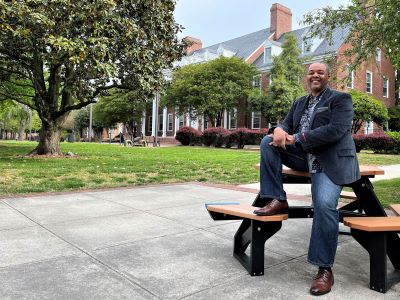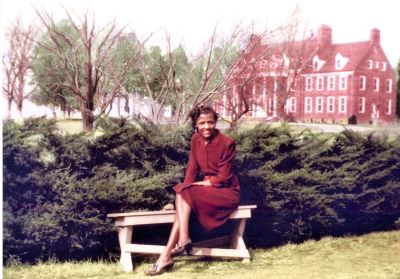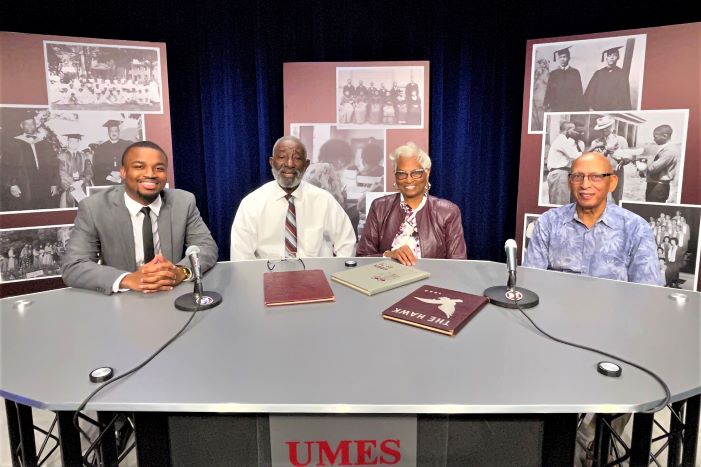
“UMES: Once Upon A Time” was a buffet of “unknown or little known” stories served up by campus history enthusiasts who drew on findings from an ongoing digitized transformation of the institution’s archives.
For one viewer who tuned in to the April 29 presentation delivered virtually via the Internet, it was personal.
During the noon-hour presentation about Princess Anne College in the 1940s, alumnus Donnell Pinder (2006) found four panelists telling the story of a great-great aunt with whom he had only passing knowledge.
Devenia Victoria Pinder of Cambridge earned a home economics degree from Princess Anne College in 1943, later returning to her alma mater to become a popular, widely respected faculty member and alumni leader.
“Hearing her story made me realize that I had family roots in higher education, which I did not know before,” said Donnell Pinder, who has worked as a mental health counselor at his alma mater since January 2021.

The midday panelists opted to tell Princess Anne College’s story by focusing on what the typical week in 1942 would be like for a single student.
UMES archives contain course catalogs that also list names of students enrolled during the mid-20th century. (UMES’ first yearbook was not published until 1959.)
Dr. Kathryn Barrett-Gaines, an associate professor of history, randomly recommended Devenia Pinder because she was not from the immediate vicinity and remembered a student in one of her classes long ago by the name of Donnell Pinder.
“From Sunday school, to her home economics classes, to her job on the student newspaper, to doing laundry in the dining hall, to jitterbugging with a boyfriend in Kiah gymnasium, to the bus (ride) home on Saturday,” Barrett-Gaines wrote, Devenia Pinder’s “life is a window into the joys and pain of HBCU campus life” in the 1940s.”
Following the hour-long presentation, Donnell Pinder surprised his former professor with a note thanking her for bringing the details of his great-great aunt’s life to his attention.
“I did not know all the accomplishments she had … at the university, and how involved she was,” Pinder said. “I was inspired because I love history. I love education and learning, and I also love helping students succeed.”
“This proved to me that I belong at UMES,” he said.
The history-sharing project started with a look at the Methodist Episcopal Church’s role in creating a place where Black children could go to school on the lower Delmarva Peninsula.
Dr. Eric Jodlbauer, who earned his doctorate from UMES in 2021, and Bishop Ernest S. Lyght of Delanco, N.J., were the featured presenters who offered insight on the ecumenical role of the church played in providing Blacks a formal education in post-Reconstruction America.
Jodlbauer, a historian, has spent countless hours stitching together the story of how Black and white ministers and church leaders in the Baltimore and Wilmington areas came together to launch the Delaware Conference Academy in Princess Anne in 1886. (UMES’ original name referred to the church organization of Black Methodist Episcopal congregants.)
Lyght’s contribution drew on first-hand experience. His father, William, was a 1926 graduate of Princess Anne Academy and became a prominent clergyman in the region. From 1941 until 1947, the Rev. William Lyght was pastor of Metropolitan (United) Methodist Church in Princess Anne, where undergraduate Devenia Pinder likely heard the elder Lyght deliver sermons.
The final session featured distinguished alumni from the Maryland State College era; Ernest Satchell (1963), Norman Tilghman (1966) and Peggy Watson Stewart (1970). Guided by student-moderator Ajani Thomas, the trio shared colorful stories of campus life during the politically turbulent 1960s.
While not immune from the social justice movement sweeping the country at the time, all agreed Maryland State was a refuge where they nurtured close bonds with classmates and the dedicated faculty members they looked up to as role models.
Thomas, perhaps, put it best as the alumni presentation he presided over wound down, noting that as Maryland State graduates, they embody the values and life-lessons instilled in them by their professors.


